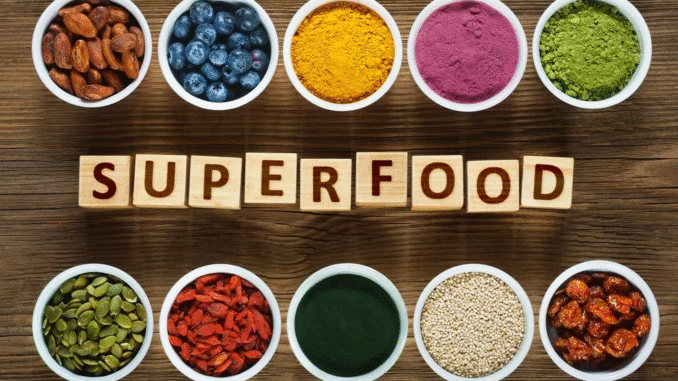
The Truth About Superfoods: What Really Boosts Your Health?
In today’s health-conscious world, the term superfood has become a marketing buzzword. From acai berries and chia seeds to kale and quinoa, these so-called nutritional powerhouses are praised for their ability to boost energy, fight disease, and promote overall wellness. But what exactly are superfoods, and do they really live up to the hype?
In this article, we’ll explore the truth about superfoods—what they are, what benefits they offer, and how to make smart, balanced choices for your health.
What Are Superfoods?
There’s no official scientific definition of a superfood. The term is commonly used to describe nutrient-rich foods that offer significant health benefits due to their high concentrations of vitamins, minerals, antioxidants, and phytochemicals. Superfoods are believed to:
- Support immune function
- Improve heart health
- Reduce inflammation
- Boost brain function
- Help prevent chronic diseases
However, no single food—no matter how nutritious—can provide all the nutrients your body needs. True wellness comes from a balanced diet and healthy lifestyle, not from eating one or two “magical” foods.
Common Superfoods and Their Benefits
Let’s take a closer look at some of the most popular superfoods and what science says about them:
1. Blueberries
Why they’re called super:
Blueberries are packed with antioxidants—particularly anthocyanins—which help neutralize free radicals and reduce oxidative stress.
Health benefits:
- Support brain health and memory
- Help lower blood pressure
- Improve heart health
Science says:
Numerous studies link blueberry consumption with improved cognitive function and a reduced risk of age-related diseases.
2. Chia Seeds
Why they’re called super:
Chia seeds are rich in omega-3 fatty acids, fiber, protein, and calcium—all in a tiny, low-calorie package.
Health benefits:
- Aid digestion
- Help regulate blood sugar
- Support heart and bone health
Science says:
While not a miracle food, chia seeds are an excellent addition to a balanced diet due to their impressive nutrient profile.
3. Kale
Why it’s called super:
Kale is one of the most nutrient-dense vegetables, offering high levels of vitamins A, C, and K, as well as fiber and antioxidants.
Health benefits:
- Supports immune function
- Promotes healthy skin and eyes
- Has anti-inflammatory properties
Science says:
Kale lives up to much of the hype, especially when eaten raw or lightly cooked to preserve nutrients.
4. Avocados
Why they’re called super:
Avocados are high in healthy monounsaturated fats, potassium, and fiber, which support heart and metabolic health.
Health benefits:
- Improve cholesterol levels
- Keep you feeling full longer
- Support brain function
Science says:
Regular avocado consumption is linked to better cardiovascular health and improved nutrient absorption from other foods.
5. Green Tea
Why it’s called super:
Green tea contains catechins, a type of antioxidant known for its disease-fighting properties.
Health benefits:
- Enhances metabolism
- Promotes fat burning
- Supports brain health
Science says:
Drinking green tea regularly may help reduce the risk of heart disease and certain types of cancer.
Are Superfoods Overrated?
While superfoods offer impressive nutritional benefits, it’s important to approach them with realistic expectations. The term “superfood” can sometimes be misleading, encouraging people to believe that eating a certain food will fix all health problems. Here’s the truth:
- No food is a cure-all.
Health comes from the overall pattern of your diet, not a single ingredient. - Marketing plays a role.
Many foods labeled as superfoods are expensive and exotic, but you can find equally nutritious options locally. - Portion matters.
Overeating even healthy foods can lead to excess calories and imbalances in your diet.
Affordable and Local Alternatives
You don’t need to spend a fortune to eat healthy. Many everyday foods offer similar benefits to trendy superfoods:
- Instead of acai berries → Try blueberries or blackberries
- Instead of quinoa → Try brown rice or lentils
- Instead of goji berries → Try raisins or dried cranberries (no added sugar)
- Instead of kale → Try spinach or cabbage
- Instead of chia seeds → Try flaxseeds or sunflower seeds
Eating a wide variety of whole, unprocessed foods is often more effective than focusing on just a few trendy items.
How to Incorporate Superfoods into Your Diet
Here are a few practical tips to make superfoods work for you:
- Mix, Don’t Fixate
Combine superfoods with other nutritious options for balanced meals. - Watch Serving Sizes
Nutrient-dense foods can be calorie-dense too. Use moderation. - Avoid Added Sugars
Many packaged superfoods (like smoothie bowls or granola bars) come with added sugars. Choose whole or raw versions when possible. - Prioritize Whole Foods
Whole fruits, vegetables, grains, and proteins are better than supplements or processed alternatives.
Final Thoughts
Superfoods can absolutely support your health—but they are not magic bullets. The key to wellness is variety, balance, and consistency. Focus on building a diverse diet that includes fruits, vegetables, whole grains, lean proteins, and healthy fats. Drink plenty of water, move your body regularly, and get adequate rest.
Remember: It’s not about the hype—it’s about creating sustainable habits that nourish your body over time.